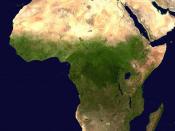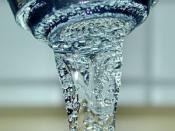Natural ecosystems require water for the survival of the plants and animals that live within them. These ecosystems help to regulate water quality and quantity of water. Wetlands hold water in periods of high rainfall, slowly releasing it during dryer periods, and purify it of heavy metals and other contaminants. Forests recharge our groundwater, which can be used elsewhere for drinking or irrigation. (Bergkamp 1) Natural ecosystems can help to prevent floods, provide shelter and millions of people are able to get their food, water, and fuel from these areas. As the world population continues to expand people are overusing water and destroying many natural resources. By destroying these ecosystems, more that 3,500 species are threatened worldwide, of which 25 percent are fish and amphibians. (Bergkamp 1) Dams block the return of salmon to spawning areas. Toxic pollution and acid precipitation kill fish; toxic metals deform waterfowl; and leaching of fertilizers promotes the growth of algae in water, which reduces oxygen levels in water killing the fish.
It isn't known what global warming will do to the renewable water supplies, but it may change rainfall, storm patterns and sea levels. Water is a scarce resource and it is predicted that 30 percent of the world's population will not have enough water by 2025. (Bergkamp 3)
Humans consume water, discard it, poison it and waste it without considering the consequences. Supplying enough water in the right quantity, at the right time and in the right place has always been a concern. All of life depends on water. It is as important to life as air, food and sunlight. For this reason water has always played an important role in civilizations throughout history. People can live for days without food but will not survive for very long without water. The problem with...


